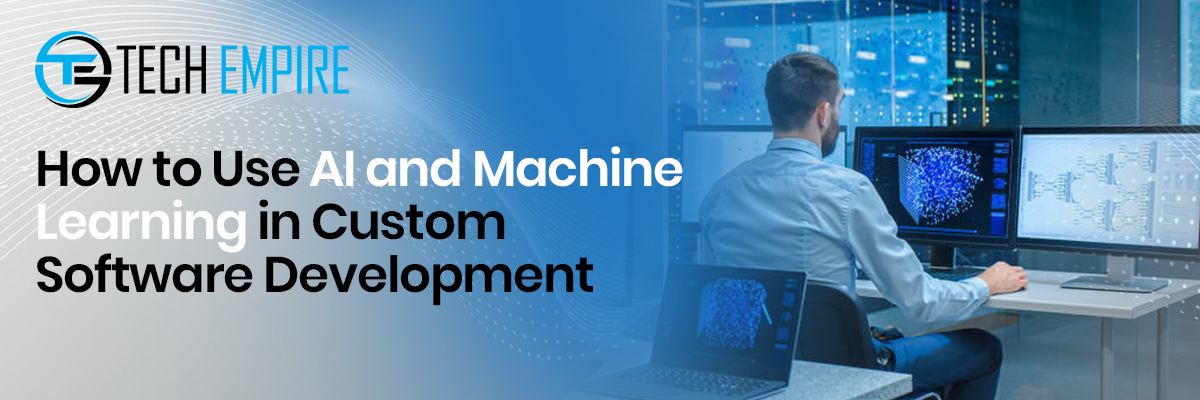How to Use AI and Machine Learning in Custom Software Development
Custom software development is no longer limited to writing code to meet specific requirements in today’s technological world.
It has evolved into a dynamic process that employs Artificial Intelligence (AI) and Machine Learning (ML) to develop bespoke solutions that address specific challenges while providing exceptional user experiences.
This article will examine how AI and machine learning play an essential role in custom software development and how these transformative technologies drive innovation across industries.
6 Essential Ways to Use AI & ML in Custom Software Development
The ability to provide personalized user experiences is one of the most significant benefits of integrating AI and ML into custom software. Traditional software frequently treats all users the same, but AI-powered software can analyze massive amounts of data to learn about individual user behavior and preferences.
This understanding enables custom software to make intelligent decisions, providing users with content, recommendations, and features tailored to their requirements. Personalization has a significant impact on user experience.
It results in increased engagement and user retention and, ultimately, a positive impact on a company’s bottom line. Users are more likely to remain loyal customers when they believe a piece of software understands and caters to their specific needs.
2. Automation and increased efficiency
AI and machine learning also improve the efficiency and automation of custom software development. These technologies effectively automate repetitive and mundane tasks that would otherwise consume valuable human resources.
From data entry and processing to complicated decision-making processes, AI-powered software can handle tasks faster and more accurately than humans.
Businesses can integrate their operations, reduce costs, and reallocate human resources to more strategic and creative endeavors by automating these tasks. This boosts productivity and allows employees to focus on higher-value activities that promote innovation and growth.
3. Predictive Analytics and Insights
Custom software combined with ML algorithms can analyze historical data to recognize patterns, trends, and correlations that human analysts may miss. This capability allows businesses to make data-driven decisions and predict future outcomes more accurately.
ML-powered software provides invaluable insights that drive better strategic planning and resource allocation, whether for sales forecasting, inventory management, or customer behavior analysis.
Predictive analytics goes beyond simply making better decisions; it enables businesses to be dynamic rather than reactive. Companies can gain a competitive advantage by anticipating potential issues or opportunities and taking action to mitigate risks or capitalize on emerging trends.
Cybersecurity threats are a persistent responsibility for businesses and users in today’s digital landscape. AI and ML are critical in custom software development to improve security measures.
Learning from previous data breaches and cyber-attacks allows ML algorithms to detect and avoid fraudulent activities in real time. Because AI-driven security features are adaptive, they can continuously evolve and adapt to threats.
This provides strong data protection, fosters user trust, and reduces the risk of costly security breaches. In an age when data breaches can have severe financial and reputational consequences, AI and ML are critical tools for protecting digital assets.
5. Natural Language Processing (NLP) and Voice Recognition
Improvements in natural language processing and voice recognition have opened up new avenues for custom software development. Integrating artificial intelligence-powered chatbots and virtual assistants into software enables more natural and intuitive user interactions.
This improves user engagement, customer support, and overall user satisfaction. A broader audience will benefit from custom software that can grasp and respond to voice commands.
It is designed for users with disabilities or who prefer hands-free interaction. NLP also enables software to understand and analyze textual data, allowing for sentiment analysis, content recommendations, and other applications.
6. Decision Support and Expert Systems
AI and machine learning can be incorporated to build expert systems within custom software. These systems mimic human experts’ decision-making processes by analyzing massive amounts of data and knowledge to provide valuable advice and recommendations.
Such decision support systems find use in various domains, including healthcare, finance, and engineering, where accurate and timely information is critical. AI-powered expert systems in healthcare can help diagnose medical conditions and recommend treatment options.
They can assist financial advisors in making investment decisions based on market trends and client profiles in finance. They can help engineers optimize complex manufacturing processes. These expert systems improve decision-making and reduce error margins, resulting in better outcomes.
The Takeaway
AI and machine learning (ML) have become critical components of custom software development, revolutionizing how businesses operate and interact with customers. The ability to support massive amounts of data, automate tasks, and provide personalized experiences has enabled organizations to remain competitive and adapt to changing market dynamics. As these technologies advance, their significance in custom software development will only grow.

